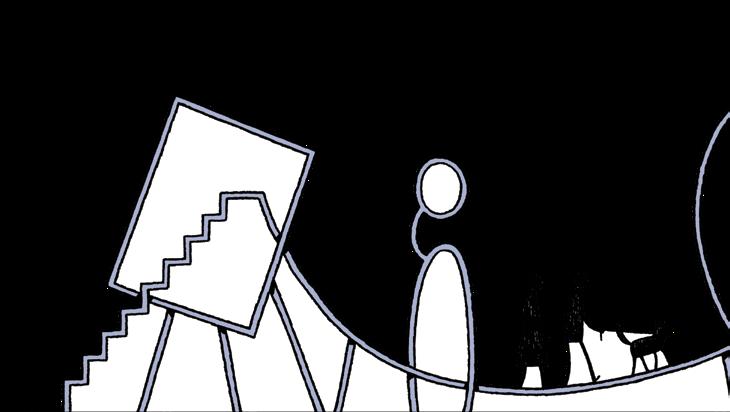
4 minute read
Media Matters
The strange decline of GB News
Full of promise, the channel became the dinner party from hell stephen glover
Advertisement
Andrew Neil was billed as the key figure in GB News, which launched in June. As I write, the channel’s linchpin has turned out to be Nigel Farage. That says it all.
Neil was for many years the BBC’s best-informed and most forensic political interviewer. Though undoubtedly of the Right, he seldom allowed his personal views to intrude. His role as the founding chairman and prospective star interviewer of GB News suggested that the new channel would have a serious core.
Farage is the father of Brexit, and a polemicist. He is overflowing with prejudices. I happen to have something of a soft spot for him, not least because he occasionally amuses me. But no one could pretend that he is a journalist or a proper interviewer.
And yet it is Farage who presides on GB News for an hour every evening, Monday to Thursday. Two weeks after the launch, Neil announced that he was taking a break ‘for the next few weeks’, and hopped off to his house in the South of France. He is supposed to be coming back in September – after an absence of months, rather than weeks – but many wonder whether he will ever return.
The word is that Neil is disenchanted with the direction the channel is taking. He envisaged it as a serious alternative to the BBC which would eschew Auntie’s in-built woke bias without being aggressively right-wing in the manner of Fox News in America. But that is exactly what GB News is becoming. If the Beeb was ever worried about competition from a serious player, it need no longer be.
The chief architect of the new channel’s unashamedly opinionated approach is its chief executive, Angelos Frangopoulos, who spent almost two decades running Rupert Murdoch’s Sky News Australia, which he modelled partly on Fox News. At GB News, he quickly fell out with the experienced director of news and programming, John McAndrew, who had declared before its launch that the new channel would not be ‘a hate-filled, divisive shout-fest’.
Only a month after the launch, McAndrew resigned, following presenter Guto Harri’s being taken off air for ‘taking the knee’. His deputy, Gill Penlington, is reported subsequently to have thrown in the towel. Meanwhile, Frangopoulos hired Nigel Farage, along with a couple of right-wing ‘shock jocks’ from Talk Radio.
I doubt that GB News will ever become a fully-fledged copy of Fox News, since it is supposedly constrained by impartiality rules overseen by the regulator, Ofcom. Nigel Farage is therefore required to behave himself. He tends to pontificate in a saloon-bar way before interviewing someone who may well hold opposing views. This is generally done in a genial and easy-going fashion, with Farage nursing a pint of beer.
He attracts a nightly audience of well over 100,000 viewers – which, although it may not sound a lot, is more than Sky News or the BBC News channel can usually muster at that hour.
Farage is quite entertaining but not at all enlightening. The same might be said of the entire channel, though most of its presenters are much less charismatic than he is, and some are embarrassingly jejune. Unable to afford camera crews and reporters on the ground, it was always bound to be something of a talking shop. GB News has 6,500 hours a year to fill, which means an awful lot of chat. It can sometimes resemble a dinner party from hell.
I expect the channel will survive in its adopted format of Fox News lite. But it won’t be much talked about across the nation. In fact, GB News probably won’t be noticed by 98 per cent of the population. As someone who resents the dominance of the BBC as a supplier of news, and longs for a grown-up rival without our national broadcaster’s cultural and political prejudices, I find that sad.
One of Auntie’s irritating foibles is to begin news bulletins with the portentous phrase ‘BBC news has learned’. It is designed to give the impression that the Beeb is the sole possessor of exclusive information. In fact, the story is frequently already plastered over the front pages of that day’s papers.
A recent example was the news that all 16- and 17-year-olds are to be offered coronavirus jabs. On the morning of Wednesday 4th August, bulletins on Radio 4 began with the statement that ‘BBC news has learned that that the joint committee on vaccination and immunisation will today recommend that all 16- and 17-year-olds in the UK should be offered the coronavirus vaccine’.
In fact, this news had already been on the front pages that morning of the Times, Daily Telegraph, Daily Mail and other papers, and had been prominent in their online versions for several hours. Why did the Beeb pretend that it alone had the story?
I expect it will soon be declaring that ‘BBC news has learned that the world is round’. Please stop implying exclusivity where none exists!










